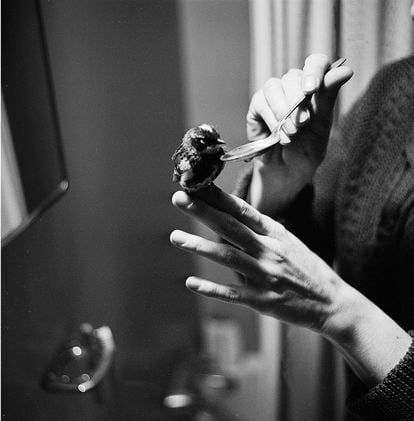They met at the home of the poet Edna St. Vincent Millay in upstate New York and remained together for four decades. “It doesn't matter if you've known someone for more than forty years, it doesn't matter if you've worked and lived with that person; you don't know everything. I don't know everything, I know just a handful of things that I'm about to tell. M. had will and spark and surely too much empathy with others; “She was quick with words and she couldn't stand foolishness,” Mary Oliver wrote about her partner, Molly Malone Cook, at the start of Our world (Comisura Editions).
The book was written and published in the United States in 2007, two years after Malone's death, but it is not an elegy. It is a text full of life and tenderness, which tells of the meeting and the life that these two women built in the Cape Cod area, specifically in Provincetown (Massachusetts). “M. It was style, it was an ancient loneliness that nothing could take away; “She was a great connoisseur of people, of books, of the emotions of the mind and heart,” continues the portrait drawn by the poet Oliver de Malone, photographer, bookseller and literary agent born in San Francisco in 1925.
The profile intersperses the black and white images that Malone took in Europe and the United States in the mid-20th century, a poem and just a few brief excerpts from the photographer's diary. “We are interested in rare books, those that are between one thing and another,” the Comisura label defends at the end of the volume in a text-allegation.
Oliver had arrived at the house of St. Vincent Millay when she was barely 17 years old, fascinated by the verses and the figure of the poet who had already died. Edna's sister, Norma, and her husband lived there, and she stayed with them for several years, according to her story. Our world, before settling in the bohemian West Village of Manhattan, New York. Some time later he returned to visit and there he found Molly. “It was seeing her and falling in love, madly in love,” she writes. It would still take them a while to forge their relationship and settle in Provincetown, the small town on the coast where the intrepid Malone had opened a photography gallery, VII Photographers Gallery, which sold images by Berenice Abbott, W. Eugene Smith and Ansel Adams. as well as Edward Steichen. The latter, in a few years in which a photography gallery was something unusual, asked her if she was rich or if she was crazy. “I'm not rich,” Malone seems to have replied. The lack of success of her project prompted her next business: a bookstore.

Oliver passed away in 2019 at the age of 83. More than half a century earlier, in 1963, he published his first collection of poems and launched a prolific career in which he enjoyed the favor of the public and critics and won awards such as the Pulitzer in the eighties and the National Book Award in the nineties. Its simplicity and elegance, its capacity for observation and sensitivity are focused on Our world in Malone and in their life together: “It was complicated, because in winter there was no tourism and few people bought books, but M. made and developed photographs, I wrote poems at the kitchen table, and we were young.” The nature, the forest and the beach that so marked Oliver's poetry are the backdrop for his life adventure in an enclave that allowed couples like them to enjoy freedom. Artists such as Robert Motherwell and John Waters were part of his circle.
A lung illness kept Malone away from the darkroom where he developed his photos and, therefore, from photography in general. In the seventies he set up a literary agency and represented, among others, Oliver. He had previously worked as a “professional and personal” assistant to the tempestuous Norman Mailer. That story and many others, such as Malone's romance with the African-American playwright Lorraine Hansberry, James Baldwin's great friend, and Nina Simone, who died of cancer at age 35, hover over Oliver's elegant portrait. The photos that Molly took of them are also included in the book, but their names do not appear spelled in the poet's memories.
Malone's impulsive character and strength shine through the page, as does the powerful connection that brought them together. “We used to wake up before the sky lightened, make coffee and let our brains set our tongues in motion. We ended up exhausted and excited,” Oliver describes. “It was a conversation that lasted forty years.”
All the culture that goes with you awaits you here.
Subscribe
Babelia
The literary news analyzed by the best critics in our weekly newsletter
RECEIVE IT
Subscribe to continue reading
Read without limits
_
#Portrait #love #story #poet #Mary #Oliver #photographer #Molly #Malone #Cook